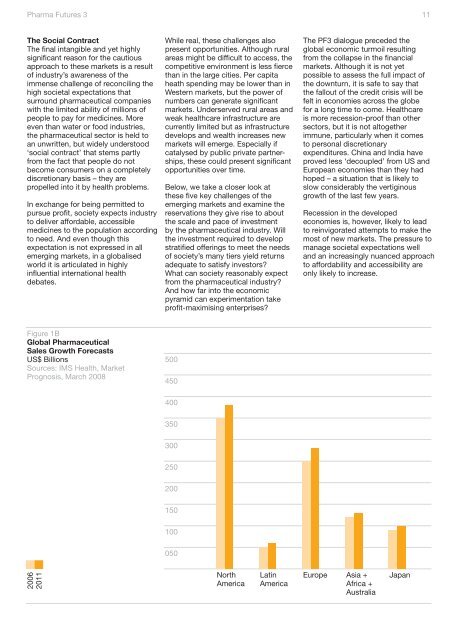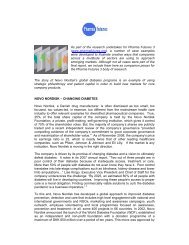Pharma Futures 3 Emerging Opportunities
Pharma Futures 3 Emerging Opportunities
Pharma Futures 3 Emerging Opportunities
You also want an ePaper? Increase the reach of your titles
YUMPU automatically turns print PDFs into web optimized ePapers that Google loves.
<strong>Pharma</strong> <strong>Futures</strong> 3<br />
The Social Contract<br />
The final intangible and yet highly<br />
significant reason for the cautious<br />
approach to these markets is a result<br />
of industry’s awareness of the<br />
immense challenge of reconciling the<br />
high societal expectations that<br />
surround pharmaceutical companies<br />
with the limited ability of millions of<br />
people to pay for medicines. More<br />
even than water or food industries,<br />
the pharmaceutical sector is held to<br />
an unwritten, but widely understood<br />
‘social contract’ that stems partly<br />
from the fact that people do not<br />
become consumers on a completely<br />
discretionary basis – they are<br />
propelled into it by health problems.<br />
In exchange for being permitted to<br />
pursue profit, society expects industry<br />
to deliver affordable, accessible<br />
medicines to the population according<br />
to need. And even though this<br />
expectation is not expressed in all<br />
emerging markets, in a globalised<br />
world it is articulated in highly<br />
influential international health<br />
debates.<br />
Figure 1B<br />
Global <strong>Pharma</strong>ceutical<br />
Sales Growth Forecasts<br />
US$ Billions<br />
Sources: IMS Health, Market<br />
Prognosis, March 2008<br />
2006<br />
2011<br />
While real, these challenges also<br />
present opportunities. Although rural<br />
areas might be difficult to access, the<br />
competitive environment is less fierce<br />
than in the large cities. Per capita<br />
heath spending may be lower than in<br />
Western markets, but the power of<br />
numbers can generate significant<br />
markets. Underserved rural areas and<br />
weak healthcare infrastructure are<br />
currently limited but as infrastructure<br />
develops and wealth increases new<br />
markets will emerge. Especially if<br />
catalysed by public private partnerships,<br />
these could present significant<br />
opportunities over time.<br />
Below, we take a closer look at<br />
these five key challenges of the<br />
emerging markets and examine the<br />
reservations they give rise to about<br />
the scale and pace of investment<br />
by the pharmaceutical industry. Will<br />
the investment required to develop<br />
stratified offerings to meet the needs<br />
of society’s many tiers yield returns<br />
adequate to satisfy investors?<br />
What can society reasonably expect<br />
from the pharmaceutical industry?<br />
And how far into the economic<br />
pyramid can experimentation take<br />
profit-maximising enterprises?<br />
500<br />
450<br />
400<br />
350<br />
300<br />
250<br />
200<br />
150<br />
100<br />
050<br />
North<br />
America<br />
Latin<br />
America<br />
11<br />
The PF3 dialogue preceded the<br />
global economic turmoil resulting<br />
from the collapse in the financial<br />
markets. Although it is not yet<br />
possible to assess the full impact of<br />
the downturn, it is safe to say that<br />
the fallout of the credit crisis will be<br />
felt in economies across the globe<br />
for a long time to come. Healthcare<br />
is more recession-proof than other<br />
sectors, but it is not altogether<br />
immune, particularly when it comes<br />
to personal discretionary<br />
expenditures. China and India have<br />
proved less ‘decoupled’ from US and<br />
European economies than they had<br />
hoped – a situation that is likely to<br />
slow considerably the vertiginous<br />
growth of the last few years.<br />
Recession in the developed<br />
economies is, however, likely to lead<br />
to reinvigorated attempts to make the<br />
most of new markets. The pressure to<br />
manage societal expectations well<br />
and an increasingly nuanced approach<br />
to affordability and accessibility are<br />
only likely to increase.<br />
Europe Asia +<br />
Africa +<br />
Australia<br />
Japan



